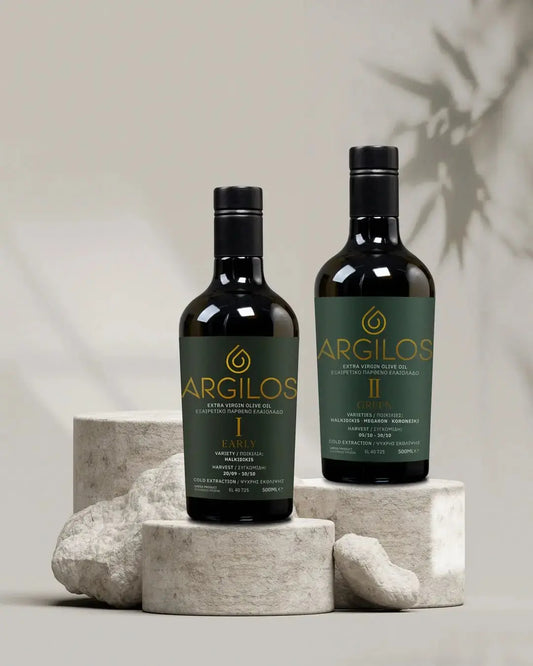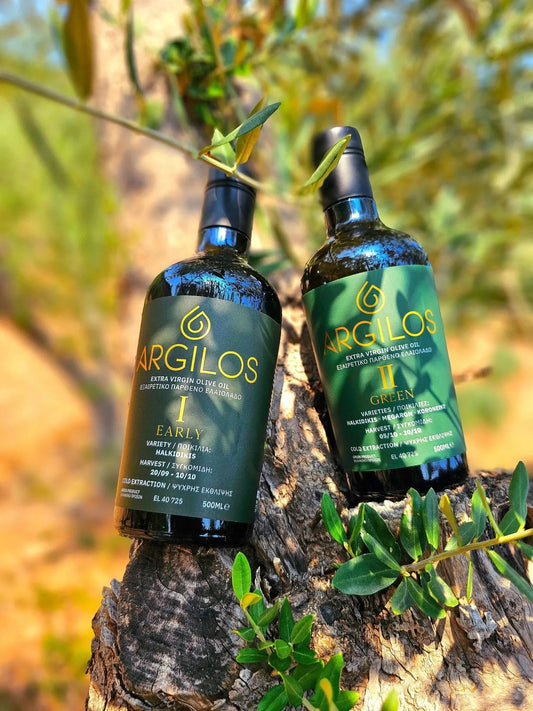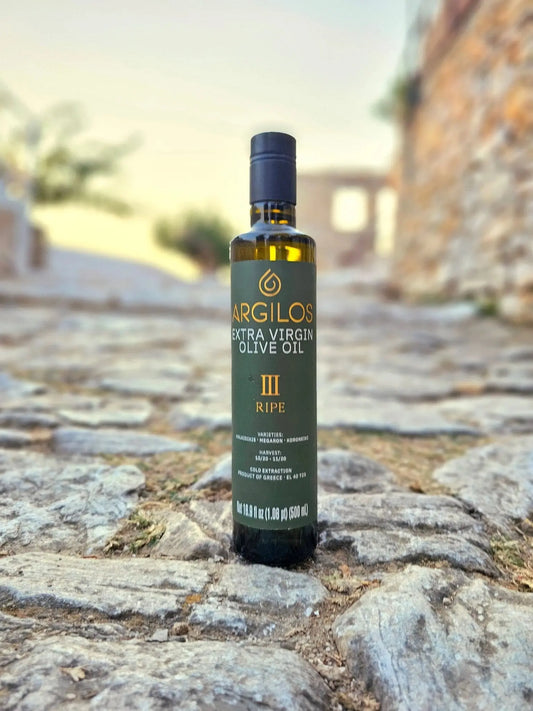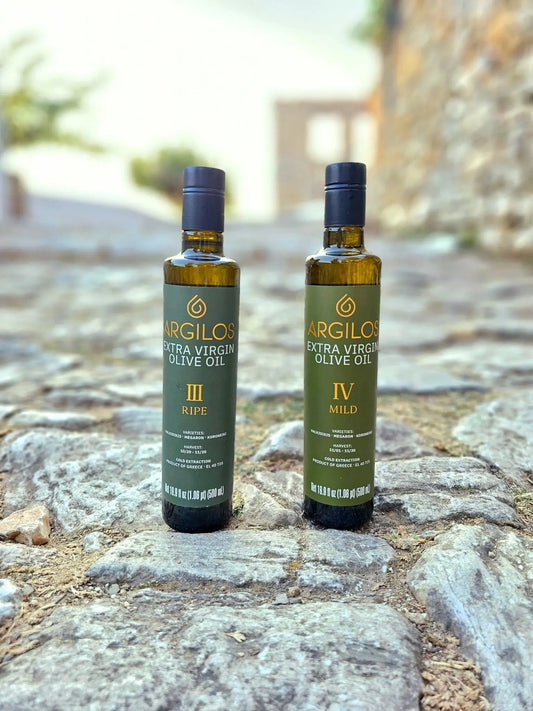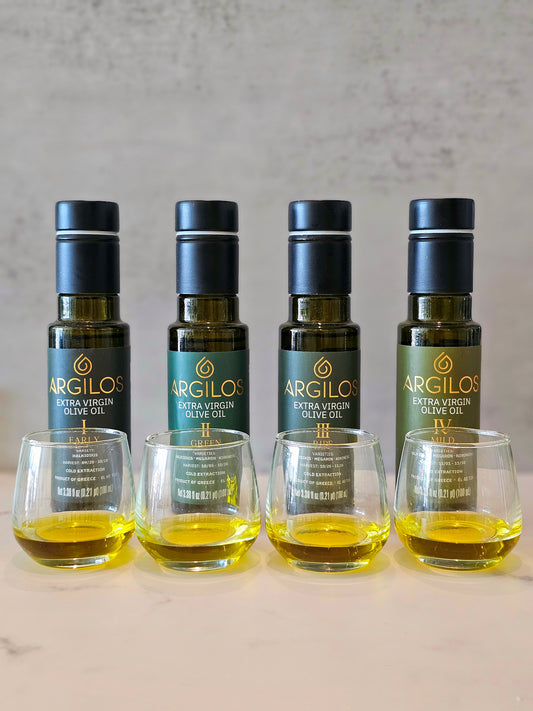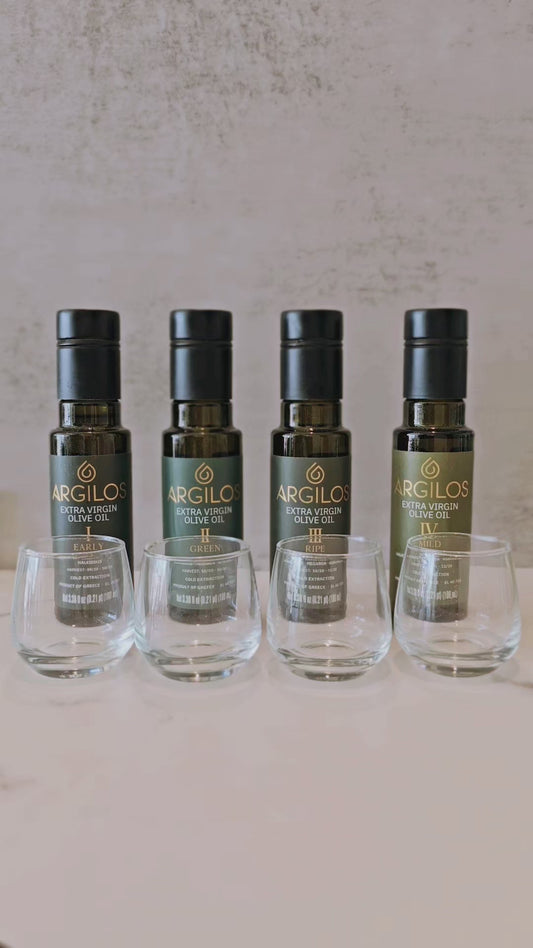Cold-Pressed vs. Refined Olive Oil: What’s the Real Difference?
Share
Cold-pressed olive oil is olive oil obtained through mechanical extraction at temperatures below 27°C without the use of chemicals or heat, preserving natural antioxidants, vitamins, and phenolic compounds. Refined olive oil is olive oil processed with heat and solvents to remove impurities, resulting in a neutral flavor but a significant loss of nutrients.
According to the University of Athens Department of Food Science (2019), cold-pressed oils retain up to 80% of polyphenols, while refined oils contain less than 30 mg/kg. This difference defines their nutritional value, sensory profile, and role in the Mediterranean diet.
Understanding the real difference between cold-pressed and refined olive oil requires comparing their extraction methods, nutritional composition, sensory qualities, culinary uses, and health impacts. These distinctions explain why cold-pressed oil is central to Mediterranean wellness, while refined oil plays a different role in modern kitchens.

What Is Cold-Pressed Olive Oil?
Cold-pressed olive oil is olive oil extracted mechanically at temperatures below 27°C without the use of chemical solvents, preserving its natural antioxidants, polyphenols, and vitamins. This extraction process is defined by the International Olive Council as the benchmark for “extra virgin” classification.
Cold-pressed production reflects traditional Mediterranean practices. The olives are crushed into paste, then pressed or centrifuged to separate oil from water and solids. Because no heat is applied, oxidative damage is minimized, and compounds such as oleuropein, hydroxytyrosol, and α-tocopherol (vitamin E) remain intact.
According to research from the University of Bari Department of Food Chemistry (2020), cold-pressed olive oil contains 150–400 mg/kg of polyphenols, compared with levels below 30 mg/kg in refined oils. These compounds are directly linked to anti-inflammatory effects, cardiovascular protection, and antioxidant defense.
Cold-pressed olive oil is therefore not only a culinary ingredient but also a nutritional cornerstone of the Mediterranean diet, where its flavor, authenticity, and health-promoting compounds define its superiority over industrially processed oils.

For the purest taste and highest polyphenol content, try the Nostos Extra Virgin Olive Oil. This cold-pressed oil preserves antioxidants and delivers authentic Mediterranean flavor straight from Greece.
What Is Refined Olive Oil?
Refined olive oil is olive oil that has undergone industrial processes such as bleaching, deodorizing, and neutralization with heat or chemical solvents, producing a clear and stable oil with reduced nutrients and a neutral taste. The International Olive Council classifies it as oil derived from virgin olive oil that is refined to remove defects, with free acidity not exceeding 0.3%.
Refining is typically applied to lower-grade virgin oils that have sensory flaws or higher acidity. Through chemical and thermal treatment, unwanted compounds are stripped away, but so are beneficial antioxidants.
According to the Spanish Olive Oil Institute (2020), refined oils lose 70–90% of their natural polyphenols, dropping antioxidant capacity to a fraction of that found in cold-pressed oils.
The process also removes volatile aroma compounds, leaving the oil flavorless and odorless. While this extends shelf life and raises smoke points, it disconnects the product from the cultural and nutritional identity of olive oil.
Refined olive oil is therefore better understood as a commodity for industrial and high-heat cooking, rather than as a wellness-focused product central to Mediterranean dietary traditions.

What Are the Nutritional Differences Between Cold-Pressed and Refined?
The nutritional gap is significant. Cold-pressed olive oil contains higher levels of antioxidants, vitamins, and phytochemicals, while refined oil mainly delivers fat without bioactive compounds.
-
Polyphenols: Cold-pressed contains 150–400 mg/kg, refined less than 30 mg/kg.
-
Vitamin E (α-tocopherol): Cold-pressed averages 12–20 mg/100g, refined falls below 5 mg/100g.
- Aroma compounds: Cold-pressed preserves natural fruitiness; refined is neutral.
- The Mediterranean Diet Foundation highlights that these compounds are responsible for olive oil’s role in lowering oxidative stress, reducing LDL cholesterol, and protecting blood vessels.
What Are the Sensory Differences?
Cold-pressed olive oil has a robust taste and aroma, described as grassy, peppery, or fruity. The International Olive Council classifies it as “extra virgin” if it scores high on flavor and has free acidity below 0.8%.
Refined olive oil is bland and odorless. It lacks bitterness or spiciness, traits that indicate antioxidants. This makes it suitable for frying but less valuable for finishing dishes. A 2021 sensory analysis at the University of Jaén confirmed that consumers rated cold-pressed oils 2.5× higher in flavor intensity than refined counterparts.
How Are They Used in Cooking?
Cold-pressed olive oil is ideal for raw applications such as salads, drizzling over bread, or finishing cooked meals. Heat above 190°C begins to degrade polyphenols, so it is best used in moderate-heat or raw preparations.
Refined olive oil is suited for high-heat cooking due to its higher smoke point (230°C compared to 190°C). Frying, roasting, and grilling benefit from refined oil’s stability, though at the expense of nutrients. Professional chefs often use refined ingredients for frying but finish dishes cold-pressed for flavor and health.
Discover authentic Greek cooking inspirations using olive oil. Explore recipes crafted around the Mediterranean diet at Nostos Goods Recipes.
What Are the Health Benefits of Cold-Pressed vs. Refined?
Cold-pressed olive oil provides documented health benefits, while refined oil delivers fewer.
-
Cardiovascular health: A Harvard T.H. Chan School of Public Health study (2020) showed that consuming 20g of extra virgin olive oil daily reduced coronary heart disease risk by 14%.
-
Anti-inflammatory action: Cold-pressed contains oleocanthal, a compound with effects similar to ibuprofen, reducing inflammation markers by up to 25%.
-
Antioxidant defense: Polyphenols lower oxidative stress, protecting cells from DNA damage and aging.
-
Brain health: A 2017 Temple University study linked extra virgin olive oil consumption to improved memory and reduced Alzheimer’s pathology in animal models.
Refined olive oil, while still healthier than butter or seed oils, does not provide these amplified effects.
Which Is More Environmentally and Culturally Authentic?
Cold-pressed olive oil represents sustainable, traditional production rooted in Greek and Mediterranean agriculture. The process requires less chemical input, preserves soil integrity, and supports small-scale farmers.
Refined olive oil, by contrast, is industrial. While efficient, it disconnects consumers from cultural heritage. For brands like Nostos Goods, authenticity is central: cold-pressed oils symbolize a direct link between Greek soil, olive trees, and the Mediterranean way of life.
Which One Should You Choose?
The choice depends on purpose:
-
For nutrition and flavor: Choose cold-pressed, extra virgin olive oil. It enhances dishes and supports long-term health.
-
For high-heat cooking: Use refined olive oil, if cost or smoke point is a concern.
-
For Mediterranean authenticity: Cold-pressed aligns with tradition, health, and taste.
Practical households often keep both: cold-pressed for finishing and refined for frying.
FAQs
What does “cold-pressed” mean on an olive oil label?
It means the oil was extracted mechanically below 27°C, preserving nutrients and flavors.
Is refined olive oil bad for health?
No, refined oil is not harmful, but it lacks the antioxidants and benefits of cold-pressed extra virgin olive oil.
Why is cold-pressed more expensive?
Cold-pressed requires more olives and careful handling. It produces lower yields, raising cost but increasing quality.
Can you fry with cold-pressed olive oil?
Yes, but prolonged frying reduces its nutrients. It is better for raw or moderate-heat cooking.
Which type is best for the Mediterranean diet?
Cold-pressed extra virgin olive oil is the cornerstone of the Mediterranean diet, supported by decades of nutritional research.

